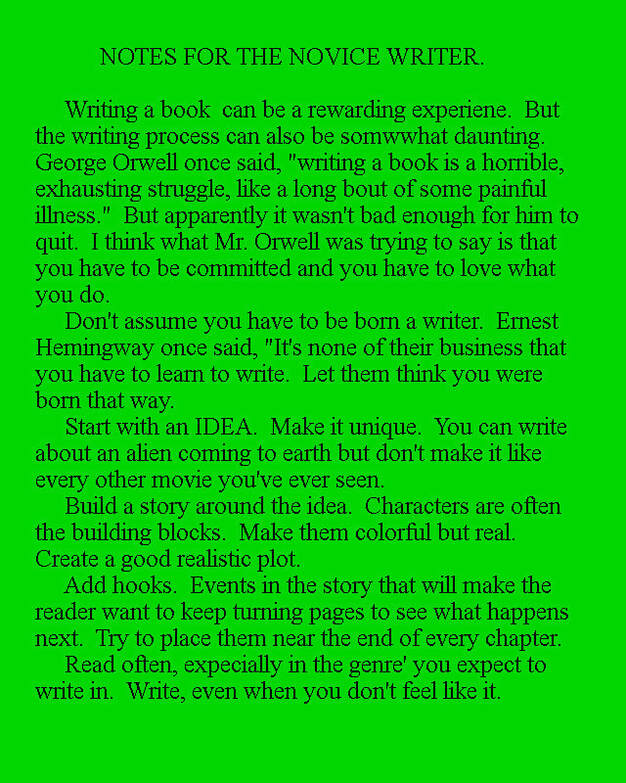|
I am still seeking a literary agent for my science fiction novel. It has been a couple of months now and I have had three rejections. One letter, a personal response, was encouraging. The agent said she loved the concept and there were some good qualities in the story but unfortunately it wasn't quite right for them. It's depressing to get turned down, but most successful authors have racked up quite a bit of rejection slips before finally making it. Also, agencies ask for only a few sample pages along with a synopsis and your bio to make a decision. I can understand that, though. Most agencies get hundreds to thousands of queries every month. They don't have time to read entire novels unless they feel strongly that one has merits.
Currently I have two queries out to literary agents. One I submitted a month ago. The other was just a couple of weeks ago. It may be days or weeks before I hear from either one of them. Something else has come up. I submitted my manuscript directly to ANGRY ROBOT PUBLISHING COMPANY. It is a publishing company located in the UK but accepts authors worldwide. They accept mostly science fiction. Normally you have to have an agent, but once a year they accept manuscripts without an agent. I was lucky, or blessed, to find them right at the time that they were open to new authors. I sent them the first three chapters. If they like what they read, they will request the rest of the manuscript. Here's hoping!
0 Comments
On September 30 I submitted a request for representation from The Knight Literary Agency. I first found out about this agency from a Facebook ad. They seemed to be what I was looking for. They appeared professional and listed several clients who went on to become bestselling authors. Though I hadn't finished my novel it was nice to have a target to shoot for. And even though their website sold me I still searched for information on them to be certain they were legitimate. I found information on them in a book titled Guide to Literary Agents. This book was endorsed by the senior editor of Writer's Digest. I was convinced. I decided this would be my first, and hopefully last stop in finding an agent for my book. This act of acquiring an agent tends to be a long process and is by no means a given. First of all, the agency receives over 1,000 submissions a month and only a handful are accepted. This is fairly normal for all the legitimate agencies. It is also just the first step. This agency has a portal where you submit all the required information. Each agent has their own portal so there may be some differences, especially regarding fiction and non-fiction works. Here are the items I had to submit: Personal information such as name, email, website (though not required), blog (though not required), and Twitter handle (again not required). Required items are word count, query letter, synopsis, bio, and first 10 pages. Now I have to wait to see if there will be a next step. For this agent it can take up to 8 weeks to hear back. If the agent is interested they will ask for the entire manuscript. Then it's another long wait. Tick tock. I have downloaded my first chapter on my site. The novel is science fiction. See if you think I have a chance.
Moving forward I have decided to seek traditional publication for my next book. I realize that as an unknown and someone who has some age on them this will most likely be a difficult task to achieve. But I think it's the right move. I seek a larger audience and a feeling of legitimacy that I can't get with self-publishing.
As I go I will document my ups and downs. I don't expect a smooth ride. In fact there may be a lot more downs than ups. In the end though I expect success. Either way It is sure to be a learning experience. I can't rightfully call this day one because the book is not finished. I have finished my first draft but I still have a long way to go. I am starting again on page one. I am looking for misspelled words and grammatical errors with the help of an app called Grammarly. At this time I will also be seeking to improve on my characters and the plot. The manuscript may get larger or smaller depending on what I find. Like other authors sometimes I think I made something perfectly clear to the reader but on second look I realized that I didn't. I hope to improve on the book quite a bit on this second draft. A third draft will be necessary to make sure I didn't miss anything. Currently the manuscript is right at 70,000 words. I see that as a reasonable length for a novel. I've read that publishers don't generally like big manuscripts from new authors.
I plan to pass on what I learn to other aspiring authors. Something that I can pass on right now is that whatever story your writing has to be great and it has to be unique. It can't be adequate or simply good. There is way too much competition out there. If you're already well known then ignore what I just said. Even if you can't write you can always hire yourself a ghost writer. Or if you're financially well-off maybe "Ghost Rider". Though I don't know how good of a writer he is.
I do plan to continue marketing my books and writing others that may be self-published. The truth is I don't know for sure what I'll be doing in the future. It just depends on what's happening at the time. So, I'll just see where this road takes me. 'nuff said.
I've been gone for a while but I'm back.
I am a writer. I write in different genres. I can't help it. My mind is always wandering. I think about what would have been and what could have been. I sometimes tell wild tales and ask that you believe me. I try to add interesting and believable characters to support my claims. My stories are generally serious but sometimes I seek to add a little humor to them. I don't like tooting my own horn. I am somewhat biased. I would rather you look at the reviews of my book and see what you think. If you like one of my books try another. My most popular book is a Christian fiction book. It has a lot of good reviews on both Amazon and Goodreads. Title: The old man and the girl. Now for a quick commercial and back to the story.
The Entity is another one of my books that has done well. It is more of a horror/thriller/occult type of story. It has a lot of characters. It involves a wild dog, possessions, and other dimensions.
I won't go through all my stories. That would be tooting my own horn. I am almost finished another book. I say almost because this is my first draft. I have to go through the book at least one more time. After that I hope to get a couple of readers to give an opinion of it. I am considering seeking traditional publishing for this one. If I do it may be a couple of years before it's out in print. Since I'm a nobody I don't expect to have publishers knocking at my door. I guess that's all I can bore you with today. This novel jumps right into the action. A thunderstorm is brewing but nothing like Molly had ever seen. When she looked out her window, she noticed that the rain was faintly luminescent. Within the falling rain, she witnessed wolves gathering on her front porch. A strange calmness washed over her, and she sensed that they would not harm her. She stepped out onto her front porch. The wolves, with their tails tucked, neither growled nor barred their teeth at her. Molly and her husband leave their house to find the world suddenly changed. It has become dark and sinister. Many are dead. Even so, the dead talk as if they weren’t. Amid this great chaos, she is befriended by a dog who leads her to believe that she needs to gather up all the children. This book reminds me a lot of another one of his books: 77 Shadow Street. Both present a world that is overcome with evil things. The difference is that 77 Shadow Street centers around a hotel. I find that Dean Koontz relies a lot on his descriptions. For the most part, I think they add a lot to the story. In regard to this book, however, I found some of them a little awkward. My opinion is that in some instances a simpler description would have been better.
The story felt monotonous to me as well. There were little surprises and the ending was a little anticlimactic. I give this book a 4. It was a decent book but not his best.
Most days I'm sane but occasionally I drift off into a fantasy world where up is down and down is up and nothing makes a lot of sense. It's on one of those days that I wrote the story below.
I was sitting in my recliner the other day watching television when I felt a tickling on my arm. I looked and at once saw a black spider about the size of a dime. In that instant, it seemed to be shimmering like a half-dead firefly. But I cannot be sure because I instantly swept it away with my hand. I jumped out of my seat and looked for the small critter. It should have been on the carpet but I did not see it. I moved my chair thinking it might have crawled underneath it. There was no sign of it. I shifted the coffee table which was a few feet in front of the chair. Nothing, nada. That was disappointing. I would not feel safe until I had killed it. I checked my arm to be certain that it had not already bitten me and for some reason, I hadn’t felt it. I could see no indication that the arachnid had punctured my skin. That was good. Though the chance that this spider was like the one that had bitten Peter Parker was astronomical, it was not impossible. I live outside a small town, not a big city. This was not the type of environment that a spider person could thrive. I ran a scenario in my head of what it would be like if I should become another spider man. It was not good. To fight crime in the city I would have to drive myself to town. There are no big buildings from here to there that I could shoot my web to and swing myself forward. The best I could do would be to try to hit a few trees and hope the branches held. And probably for half the time, I would even have to walk. That would be a little embarrassing and it would be hard to hide my identity. It wouldn’t be much easier once I reached town. The courthouse is the largest building in the town, and it is only three stories high. Furthermore, it sets on a large plot of land that is separated from the retail shops, businesses, and restaurants. It is too far away for me to swing between the courthouse and the other establishments. Swinging through the rest of downtown wouldn’t be much easier. The buildings down Main street are either single or two-story. If I tried swinging through town on a web I would likely run into pedestrians or skim across the sidewalks. Even if I were successfully staying high enough off the ground my journey would only be a matter of minutes. I would run out of buildings and be out of town. It was unlikely that I would find any high-profile criminals around here anyway. My biggest fights would likely be with small-time drug dealers or shoplifters. I do not think it would even be worth making the costume. Besides,I couldn’t make the costume like the one in the comic books and the movies anyway. I am sure Marvel or Disney has a trademark or a patent on the suit. I can’t sew. That would be a problem if I needed a suit. I guess I would have to hire someone and hope they wouldn’t reveal my identity. It was after that thought that I checked myself again. No bite marks. I searched the area again for the spider. It seems the creature had disappeared. Hopefully, the spider won’t return. I don’t want to have to move to the big city and fight crime. I’ve gotten comfortable living in a small town. Besides, it sounds like too much work.
The first Stephen King book I read was “The Stand”. Undeniably it was a great story. But what drew me into this story more than anything else were the characters. He painted them so magnificently that I felt like I knew them. And this was not a story of three or four characters. There were plenty of them. Yet, none of them were the same. This was not simply a matter of changing their hair styles, or the color of their eyes. He displayed their inner being that distinguished one personality from another. These were not simply cardboard people. I could see them in my mind’s eye. Some would disagree with me but to me the characters are the main heart of a story. Though the storyline might be ingeniously written, but if the characters seem phony then it is not going to seem believable. Here are a few steps to create real, believable characters. 1) You must become the character that you write about. Any serious actor will spend a great deal of time getting to know the person he is to portray. In some ways the writer must do the same. You must first believe in this character you are creating before you can expect others to believe. It is a good idea to know more about your character than you actually put on the page. 2) Find the voice of the character. If you know your character, then you should have some idea of how he speaks. Is he loud and boisterous, is he timid, is his voice soft or harsh, does his words exude confidence, is he negative, impatient, does he have a draw, does he use words incorrectly, does he repeat himself, etcetera. 3) Match the mood of the story. If the story becomes tense the dialogue should go with it. If done right it will intensify the mood, making the story richer and will serve to move and/or deepen the plot. 4) Pacing. Dialogue in a story can speed up or slow down the speed of the story. To speed it up you should use short, quick remarks, often words that displays an urgency to the scene. To slow down the pace you would want to expand the dialogue making it seem less of an urgency. 5) Create realistic dialogue as the conflict rises. Not every dialogue is the same. Some should be avoided. Some should be embraced. 1) Avoid a dialogue that goes nowhere. If the dialogue does not advance the scene by adding some type of insight, then it should be avoided. 2) Avoid leaping. Don’t jump directly from problem to solution. There should be some steps in between. If not, the reader is likely to feel cheated and mentally dizzy from the jump. 3) Embrace a gradual rise. Move the story along in slow steps, increasing the level of suspense and should help lead the story to a satisfactory ending. 6) Dialogue is a necessary part of any story, but don’t let it overwhelm the narrative. Like the adage goes; actions often speak louder than words. 7) Avoid dialogue that repeats what the reader has already been told through action or previous dialogue. This is a rather obvious note but sometimes we forget what we created earlier in the story. 8) Read the dialogue aloud. Make sure it sounds natural to the character. A professional businessperson would not normally speak the same as a blue-collar-worker. The same with people from the north compared with people from the south. Like anything in life there are exceptions to these statements. But if there is no reason for these deviations it can make the character seem unreal. Having a famed surgeon speak like a mob boss will likely cause the reader to lose interest in the story.
Click to set custom HTML
Having written a book, a short story, an article, or any number of writing projects can be a rewarding experience. But the writing process can be somewhat daunting. George Orwell said: “Writing a book is a horrible, exhausting struggle, like a long bout of some painful illness.” That is a gloomy thought, but it can sometimes feel like that. At other times, when it seems that the words are just flowing to you as if from a higher power it is exhilarating. It makes you feel like you have found your purpose. Do not assume that you have to be born a writer. Ernest Hemingway once said, “It’s none of their business that you have to learn to write. Let them think you were born that way.” AN IDEA. You start with an idea. For the most part, it needs to be unique. It needs to be something that hadn’t been run into the ground by a thousand other authors. As a beginner, this is very important. A skilled author, such as Stephen King, could take a heavily used idea, or a mundane idea, and turn it into something exciting by the use of his characters. Most of us, however, could not do that. Ideas are everywhere. Just look around. They are in the news, at the movies, in the magazines, at the grocery store, and on and on. Finding an idea is not the hard part. It’s honing it down and reshaping it so that it is unique. Do you think that Stephen King’s “Dome” is completely original? Robert R. McCammon’s book “Stinger” had a dome in it. Granted, other than that the two books are nothing alike, but it shows you that one spark of an old idea can lead you to something unique. Ideas typically stay within the confines of the genre’ you’re writing in, though not always. Writing stories has become a rather fluid art. A western story would normally cover gunslingers, sheriffs, horses, cattle, bank robbers, trains, and other such things of the wild west in the 1800s and early 1900s. But not aliens. But then along comes “Cowboys and Aliens.” So, what are we to make of this? For someone who is writing their first book, I would say to keep it close to what the genre’ you’re writing in stipulates. If you are writing a crime novel, try not to throw too many other genres’ in there. Making the main character a vampire from the future who decides to become a detective probably would not work. I am not saying that it’s impossible for a story like that to become a big hit. But it would take a very skilled author to pull it off. THE STORY. Now that you have your idea you need to create the story around it. Suppose your idea is that a large meteor strikes the earth. Okay, it has been done a few times. But it can be made unique. I think to begin with you have to ask yourself the questions a good reporter asks. What, where, when, why, and, how? Now, all these questions don’t create the story. They merely serve as the framework. But it is something you should know even if it’s not necessary to put in the story. Next, you should plot the story. Write a very general idea of what happens in the story and a tentative ending. This gives you a direction to go in. If you are like most authors, however, the story will change as it progresses and the ending you chose may not happen the way you planned. That is okay. Sometimes the characters dictate how the story goes. For now, you need a direction to start. CHARACTERS. They are the driving force of a good novel. Sometimes they can make up for a poor storyline. That is not to say you should not put forth an effort to make the story idea good. Every part of the story is important. Sometimes the characters just seem to stand taller. Stephen King has said: “I try to create sympathy for my characters, then turn the monsters loose.” A character needs to be alive. Alive in the sense that the reader can see this person in their mind. They often have met this type of person or have heard of them. This believable character can be created in several ways. Through dialogue: this can disclose a myriad of information about the character. Even without a physical description of the character, one can sometimes imagine what the character looks like. Even so, it is often best to give some description of the character as well. STARTING THE STORY. For the relatively unknown author, I would suggest a fast start. You need to have some action in the first few pages, as well as something to snag the reader. There needs to be a reason for the reader to keep reading. Unless people are familiar with your work and are a fan of it, most will assume that the rest of the story is also slow, and maybe even boring. As a rule, people are not willing to give their time and attention to something that they are not sure of. T.S. Elliott said, “If you start with a bang, you won’t end with a whimper.” BE LOGICAL. It does not matter that the story is fiction. You must make your audience believe that what you are saying is possible even if the idea at first seems absurd. You can’t have a person suddenly flying around breaking the laws of physics. Unless you state a good reason for it. If a normal person gets caught in a rainstorm you would not expect the person to suddenly be able to fly. But what if he were struck by lightning in that same storm while carrying a briefcase of unknown chemicals. While on the surface it still seems impossible, but many readers will be thinking that there must be something in those chemicals to cause this anomaly. Creating coincidences in your story is a rather delicate thing. You may get away with it once or twice, but you are taking a chance that your readers are going to give up on your story because it is no longer believable to them. HAVING HOOKS. Try to end a chapter with a hook. That is something that will drive them into the next chapter. An example would be: A key is found. This leads to questions. Why is this key hidden behind a picture on the wall? What does this key open? Why is it important? This will entice the reader to go to the next chapter to find the answers to these questions. I think it’s safe to say that all writers have writer’s block at one time or another. That doesn’t mean that the writer stops work though I’m sure some do. As for the self-published writer, there is always a need for marketing your work when the block sets in. For me – and I don’t think I’m alone – I always have more than one project going on at one time and other projects I’d like to start.
I can’t continue with partial projects, so I always find one to focus on and to finish. In those cases, I have to find a way to break my writers’ block. What I have found most useful is simply walking. I have a trail that I have made around my property. I turn some music on my phone and walk at a good pace. I like the exercise as well. I don’t force a solution to come to mind. I may go over my options, but my thoughts are not all-consuming. My mind is also on the music and walking. Somehow in this relaxed state ideas come to mind. This is not, however, a 100% money-back guarantee. Let me explain. There are primarily two types of writers. One is the writer who knows the ending before he begins the story. Some have even suggested that you write the ending before you begin. That all seems logical. But that’s not how I do it. I fall into the second category. The second type of writer starts a story not knowing exactly where they’re going. They rely on the plot and characters to take them to a satisfactory ending. This type of story has its problems, but it is what I like. What’s the fun in writing something when you already know the ending? Believe me, some of these characters take you in directions that you never thought of. I’m not unique in this category. Stephen King also writes his novels in this way. And, according to him, he has had problems with this type of writing as well. Mostly it’s ending up in a dead-end and realizing there is nowhere else to go. Even when you know the ending of the story your composing, you’re not immune to writer’s block. Assuming you don’t know every step that you will be taking to get you to the end. Sometimes you just have to push through writer’s block. Inspiration is great, but you can’t always rely on it. Don’t wait for it to happen. I have found that if I keep pushing even though I don’t feel like it, inspiration will often show up. Final thought: writer’s block is only a temporary condition. Don’t let it stop you. |
AuthorWhen I write a blog, I try to keep it relevant. Often it will be about writing and books. I also review books that I read. Archives
May 2024
|











 RSS Feed
RSS Feed
